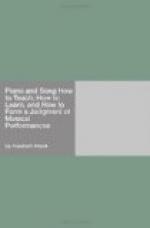I will speak now of the selection of pieces. Our ladies are not contented to play simple music, which presents few difficulties and requires no involved fingering; and from which they might gradually advance by correct and persevering study to more difficult pieces. They at once seize upon grand compositions by Beethoven, C.M. von Weber, Mendelssohn, Chopin, and others, and select also, for the sake of variety, the bravoura pieces of Liszt, Thalberg, Henselt, &c. How can they expect to obtain a command of such pieces, when their early education was insufficient for our exalted demands in mechanical skill, and their subsequent instruction has also been faulty and without method?
If you were to request me to supply in some degree your own deficiencies, before I proceed to the further education of your daughter, I should not begin with the wisdom of our friend Mr. Buffalo: “Madam, you must every day practise the major and minor scales, in all the keys, with both hands at once, and also in thirds and in sixths; and you must work three or four hours daily at etudes of Clementi, Cramer, and Moscheles; otherwise, your playing will never amount to any thing.”
Such advice has frequently been given by teachers like Mr. Buffalo, and is still daily insisted on; but we will, for the present, set such nonsense aside. I shall, in the first place, endeavor to improve your touch, which is too thin, feeble, and incorrect; which makes too much unnecessary movement, and tries to produce the tone in the air, instead of drawing it out with the keys. This will not require a long time, for I have well-formed, young hands to work upon, with skilful fingers in good condition. I will employ, for this purpose, several of the short exercises mentioned in my first chapter, and shall require them to be transposed into various keys, and played without notes, in order that you may give your whole attention to your hands and fingers. Above all things, I wish you to observe how I try to bring out from the piano the most beautiful possible tone, with a quiet movement of the fingers and a correct position of the hand; without an uneasy jerking of the arm, and with ease, lightness, and sureness. I shall certainly insist upon scales also, for it is necessary to pay great care and attention to passing the thumb under promptly and quietly, and to the correct, easy position of the arm. But I shall be content with the practice of scales for a quarter of an hour each day, which I require to be played, according to my discretion, staccato, legato, fast, slow, forte, piano, with one hand or with both hands, according to circumstances. This short time daily for scale-practice is sufficient, provided, always, that I have no stiff fingers, or unpractised or ruined structure of the hand to educate. For very young beginners with weak fingers, the scales should be practised only piano, until the fingers acquire strength.




